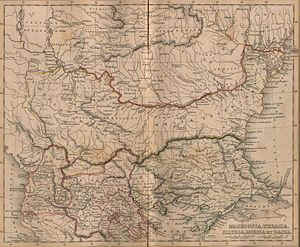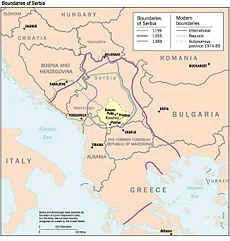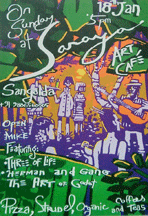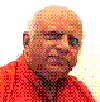Kosovo
Ancient History - Current History
http://en.wikipedia.org/wiki/History_of_Kosovo
Little is known about Kosovo before about the 11th century AD. The region was certainly inhabited in prehistoric times, it appears, by two different cultures: Bronze and Iron Age tombs have been found only in Metohia, and not in Kosovo.[1] After the Indo-European invasion, Kosovo became inhabited by Illyrian and Thracian tribes, such as the Dardani and the Triballi. Later, the whole territory of Kosovo became part of the Roman Empire, although it is not clear whether it was part of the province of Moesia or was divided between Dalmatia and Moesia (a view which is supported by some archaeological evidence).[1]
Slavic peoples
According to most historians, Slavic peoples entered the Balkans around the late 6th or early 7th century AD, possibly migrating from the northern Caucasus where Ptolemy placed the "Serboi" in the 2nd century. After 850, Kosovo was part of the Bulgarian Empire until 1018 AD. It was taken by the Serbs in the 13th century. The initial spread of the Slavic population of the Balkans was much larger than today, reaching well into Greece.
 |
The Kosovo region has been taken, retaken, and ruled by several empires. It lay both on the outer fringes of the Byzantine Empire and directly in the path of Slavic expansion. From about the 850s until about 1014, it was ruled by Bulgaria. Byzantine control was subsequently reasserted by the forceful emperor Basil II. Serbia at this time was not a united empire: a number of small Serbian kingdoms lay to the north and west of Kosovo, of which Raška (central modern Serbia) and Duklja (Montenegro) were the strongest. In the 1180s, the Serbian ruler Stefan Nemanja seized control of Duklja and parts of Kosovo. | ||
most of the area which is now Serbia and Montenegro.
The ethnic composition of Kosovo's population during this period included Serbs, Albanians, and Vlachs along with a token number of Greeks, Armenians, Saxons, and Bulgarians, according to Serbian monastic charters or chrysobulls. A majority of the names given in the charters are overwhelmingly Slavic rather than Albanian. This has been interpreted as evidence of an overwhelming Serbian majority. This claim seems to be supported by the Turkish cadastral tax-census (defter) of 1455 which took into account religion and language and found an overwhelming Serb majority. Ethnic identity from the Middle Ages was somewhat fluid throughout Europe, and people at that time do not appear to have defined themselves rigidly by a single ethnic identity. Those of Slavic origin, particularly of the Serbian background, appear to have been the dominant population culturally and were a demographic majority as well.I |
|||
His successor, Stefan Prvovenc(ani took control of the rest of Kosovo by 1216, creating a state incorporating
Debunking the pro-Kosovo Independence Claims, American Chronicle February 14, 2008 on 3:06 am | In News in English, Kosovo & Metohija, In Focus |
Serbian Objections to Independence
By Michael Averko
http://news.serbianunity.net/2008/02/14/5982/
Numerous reasons are presented to support Kosovo’s independence. Upon presentation, there is often little challenge to those points. Much of the pro-Kosovo independence advocacy involves fuzzy history and double standards. What follows is a compilation of thoughts I have expressed elsewhere and additional views. Kudos to those sources that provide very good supporting material (some of them are listed at the end of this article).
In an effort to deflate Serbia’s claim on Kosovo, Albanian nationalists portray the province as being initially inhabited by Albanians. In conjunction with that view is the comment about Slavs arriving in the Balkans after the Albanians. The origin of the Albanians is a matter of historical debate. It is said that modern day Albanians are likely derived from one or more groups, who were in the Balkans before the Slavs. In terms of significant numbers and a well established presence, reasonable evidence indicates that the Serbs predominated the Kosovo area of the Balkans before the Albanians. More recent history shows that the Albanian numbers in Kosovo started to increase in the 15th century, after the region had a noticeably inhabited Serb makeup.
The more convincing pro-independence argument focuses attention on Kosovo’s present day Albanian majority, overwhelmingly favoring separation from Serbia. The past 120 years have seen a process of Albanians replacing Serbs as the majority in Kosovo - a demographic change resulting from a series of ethnic cleansing campaigns, immigration from Albania (much of it illegal) and the comparatively high birth rate of Albanians.
Kosovo has been part of modern day Serbia since 1912. Centuries before, it had been an integral part of Serbia. Kosovo was never part of an independent Albania, or an independent entity unto itself. Kosovo’s historic attachment to Serbia is very real and legitimate. It is therefore inappropriate to dislodge Kosovo from Serbia. Allowing Kosovo great autonomy as a continued part of Serbia can hypothetically include the province having full United Nations membership (like Belarus and Ukraine during Soviet times) and International Olympic Committee representation (like non-nations Puerto Rico, British Virgin Islands and Hong Kong). This scenario appears to come closest to simultaneously matching the conflicting Albanian and Serb desires.
For consistency and fairness sake, Republika Srpska (the predominately Serb portion of Bosnia) would be offered the same option (in Republika’s Srpska’s instance, a continued affiliation with Bosnia). Based on the existing circumstances, the whereabouts of Ratko Mladic and Radovan Karadzic (two Bosnian Serbs leaders wanted by an overly politicized legal body, who are thought to be residing in either Republika Srpska and-or Serbia) is not a valid counter-argument against Republika Srpska’s inclusion. The dubious trio of Hasim Thaci, Ramush Haridnaj and Agim Ceku are considered acceptable leaders for Kosovo. Like Kosovo, Republika Srpska’s territory was part of former Yugoslavia. Unlike Kosovo, Republika Srpska has the status of a republic and shows itself capable of governing a multi-ethnic land at peace.
Diehard anti-Serb/pro-Kosovo independence enthusiasts are not convinced by this proposal. They have a series of talking points which in their view legitimizes the dismembering of Serbia.
One of them pertains to the period from 1974-89, when the non-Serb Communist dictator Tito granted Kosovo autonomy as part of the Serb republic in Yugoslavia. The follow-up claims that Kosovo during that period was essentially a republic. In point of fact, it remained a continued part of Serbia. That period of great autonomy saw an increase in violence against non-Albanians.
This reminds one of how the concept of American “states’ rights” has been viewed. It is ideal to allow a reasonable amount of regional autonomy. But what if such a scenario results in a greater ethnically related persecution? During the Kosovo autonomy years, Western mass media news reports detailed the increased ethnic violence in that province. By 1988, a consensus was reached in Yugoslavia about the failure of autonomy in Kosovo.
Enter the period of armed skirmishes between Yugoslav authorities and the Kosovo Liberation Army (KLA). The 1999 NATO led bombing of Yugoslavia in support of the KLA is an example of what happens when a country does not have nukes, Capital Hill lobbying clout and membership to an American club. Reference Russian actions in Chechnya, Israeli strikes against its adversaries and Turkish actions against the Kurds. For that matter, note the number of civilians killed as a result of the 2003 American led attack on Iraq. These examples are given to put into perspective how the Serbs have been mistreated.
This mistreatment is compounded by the thought that as punishment for fighting the KLA, Serbia lost the right to Kosovo. United Nations Security Council Resolution 1244 contradicts that belief. It specifically states that Kosovo is a part of Yugoslavia. Serbia is internationally recognized as the successor state to Yugoslavia. In Communist and post Communist Yugoslavia
Kosovo was part of the Serb republic. UNSC 1244 calls for a return of refugees, as well as of Serb military and government bodies to Kosovo. This has yet to happen. In legalese, the 1244 clause about taking into “full consideration” the unsigned Rambouillet diktat is not a green light for independence. It simply means that aspects of Rambouillet can perhaps be considered. Prior to the NATO bombing of Yugoslavia, the Clinton Administration and Kosovo Albanian nationalists wrote a clause in Rambouillet which would have (if signed) permitted Kosovo to vote on independence after three years from the accord’s signing. I specifically recall noted American University law professor Paul Williams bragging about his having written that segment on Geraldo Rivera’s MSNBC cable news show. No one questioned Williams’ objectivity as a then adviser to the Kosovo Albanian nationalist leaders. Madeleine Albright was quoted as having said that Rambouillet was written in a way that was unacceptable to the Serbs. An obvious pretext for starting the war that was to be. The “final outcome” status for Kosovo is stated towards the end of 1244. It relates to how Kosovo should be governed as a part of Serbia. What other logical way can be otherwise suggested when the very same document recognizes Kosovo as part of Serbia, while stating that refugees, Serb government and military bodies should return to that province?”
Turkey and Iraq have not lost parts of their land to create a Kurdish state. Past Kurdish and Turkish actions against Kurds were more oppressive than what the Serbs could be legitimately accused of doing to the Albanians. Keep in mind that there is much wrong to be found on the Albanian side. Serbia minus Kosovo is more democratic than Kosovo, Iraq and Turkey.
The view that Kosovo is a “special case” for independence is not in sync with a reasoned comparison of the disputed former Communist bloc territories. Regarding human rights and history, Pridnestrovie (Trans-Dniester) has a much better case for independence than Kosovo. Pridnestrovie’s historical relationship with Moldova is nowhere near as close as Kosovo’s ties to Serbia. Pridnestrovie has better economic conditions than Kosovo. The former is also free of the level of ethnic divisiveness in the latter.
There is a somewhat Machiavellian reason for going against the Serbs - the idea to please the “Muslim street”. Russia has sympathized with Serbia and fought a war involving predominately Muslim Chechnya. Yet, Russia does not seem to be as much on the hit list of Muslim extremists when compared to some other countries. Some have stated that the Russian-Serb fraternizing is over-emphasized. Seeing how Russia is not so chastised in the Muslim world, it appears that the Muslim street point to support Kosovo’s independence is the more overrated of the two views.
The inconsiderate attitudes taken against Serbia and comparatively greater concern for accommodating Muslim concerns (real and exaggerated) bring up the not so talked about matter of there perhaps being a bias (subconscious or otherwise) against Slavic Orthodox Christians and Orthodox Christians at large. If I’m not mistaken, Ukraine’s slant continues to not side with Kosovo independence. If true, note how some Ukrainian views get propped over others (like the ones bashing Russia, which are not shared by many in Ukraine).
Adrian Karatnycky’s 1999 article “The Condescension of the Christian West” has a few compelling observations. Among Western intelligentsia, not much effort is given to consider the views of Orthodox Christians on issues like former Yugoslavia. On the other hand, there is concerted effort to understand and reach out to perceived Muslim interests (real and exaggerated). The populations in predominately Orthodox Christian countries were overwhelmingly against the 1999 Clinton administration led NATO bombing of Yugoslavia (Serbia and Montenegro).
Religious extremism is not relegated to one faith. Note that Orthodox Christians do not propagate their causes by guiding vehicles into office buildings and military installations. Punishing passive behavior in favor of the law of the jungle is not civilized. Some Albanian nationalist leaders and their Western supporters have hinted that enhanced violence might occur if Kosovo does not become independent. Rather than condemning such comments, they suggest that it is a valid reason for supporting independence. This opinion encourages violence as a means of independence elsewhere.
More Reading
http://news.serbianunity.net/2008/02/14/5980/
http://news.serbianunity.net/2006/12/11/661/#comment-479729
Joy and defiance on Kosovo's greatest day
Ten years ago Peter Beaumont watched a brutal war engulf Kosovo as it tried to break away from Serbia. Here he returns to the tiny territory on the eve of its declaration of independence and asks whether it can escape its legacy of violence
http://www.guardian.co.uk/world/2008/feb/17/serbia.kosovo
New Born', the installation will announce when it is finally lifted into place, in seven steel letters 6ft tall, painted in multiple colours, to be set up not far from Pristina's Grand Hotel.
Those celebrating Kosovo's independence - the birth of Europe's newest state - will be invited to sign the faces of the letters with their own goodwill message.
The first to scribble down his thoughts on Independence Day will be Hashim Thaci, Kosovo's Prime Minister and the Kosovo Liberation Army's former political commissar, once known by his nom de guerre of 'Commander Snake'.
In the end it has been a pell-mell, 10-day rush to be ready for a day that has been spoken of throughout Kosovo Albanians' lifetimes. In the sports hall of Kosovo's new capital, the Philharmonic Orchestra, which rehearsed each day last week, will play from eight in the evening until 11. For those preferring something more raucous, some of Kosovo's most popular pop stars - including rapper Memli Krasniqi, now an MP in Thaci's PDK party - will perform on a stage set up not far from Skanderbeg Square.
At the conclusion, there will be fireworks. The speeches, say political sources, will be short to the point of non-existence and the party long - at least for the ethnic Albanians who make up the country's majority. For the Serbs who once ruled this place, it will be a sad and, for some, a very frightening occasion.
Almost a decade has transformed not only the country's physical space - a rural hinterland that in large areas has disappeared under malls and apartment blocks and petrol stations - but its ethnic and psychological space, too. In 1998 and 1999 it was a place that was grimly run-down and repressive, dominated by Serb police and officials.
The symbol of Kosovo: an eagle with two faces – each looking a different way
Albanian Kosovars are celebrating, but the Serbians in their midst remain fiercely hostile to an independent Kosovo, and to the EU's police and justice mission to the fledgling nation
By Peter Popham in Mitrovica, Kosovo Sunday, 17 February 2008
As Kosovo prepared for its independence and the biggest party in its history today – 80 tons of fireworks have been imported and that's just for the official celebration – the European Union announced that it will provide a 2,000-strong police and justice mission to the fledgling nation. It will include 700 police as well as judges, prosecutors and other legal experts, and will replace United Nations administrators over a 120-day period.
The announcement from Brussels drew immediate condemnation from the Serbian government in Belgrade. Slobodan Samardzic, Serbia's minister for Kosovo, called the decision "shameful". The mission "officially recognizes the independence of Kosovo," he said, "which remains an inalienable part of Serbia".
When independence comes this afternoon, Albanians in the divided city northern city of Mitrovica will be partying as hard as anyone. The southern part of the city is festooned with Albanian flags, the roads strung with bannerswhich declare: "Gezuar Pavaresia" – or "happy independence".
Yesterday, the festive mood had already taken hold; 14-year-old Mervan Gashi strode proudly with a double-eagle flag draped over his shoulders. "We've waited so long for this day," said his friend Ilir Becaj, 13. "We're feeling great, and we're not worried about security because KFor" – the Nato force garrisoned across Kosovo since the end of its civil war – "will protect us."
"It's going to be the biggest party in the history of the world," declared Hajdari Hajdar, an elderly man in a beret and long black coat. "We've waited centuries for this. We are only in this miserable condition because of the Serbs, if it wasn't for them we'd be like the United States. For hundreds of years we've sent all our wealth to Belgrade. Not any more!"
But on the far side of the shabby bridge that both joins and divides this gritty industrial city, the mood was very different. Since the war ended in 1999, Mitrovica has been the most explosive corner of the Balkans, the flashpoint where paramilitaries enforced a strict ethnic split. Serbians live on the north bank of the River Ibar and the suburbs that climb the steep hills overlooking the town, and Albanian Kosovars are confined to suburbs south of the bridge. The communities are almost within spitting distance, but for eight years they have kept to themselves.
Violence erupted here in March 2004 when two dozen people were killed and hundreds of houses destroyed under the noses of Nato troops. That showed how easily one spark can start a conflagration. On Thursday night a bomb went off in the Serbian quarter, in a house next to the offices of the EU mission. There were no injuries.
The Serbian paramilitaries, who years ago forced Albanians out of their homes and across the bridge, hung out in the Dolce Vita coffee bar, strategically located within sight of the bridge. Yesterday this smoky den was crammed with short-haired, muscled young men, but the mood was laconic.
"For the moment things are quiet," said Alexander Veselinovich, 36, an electrical engineer born in the town. "But people are a little bit afraid because they have had negative experiences with these types of celebrations and they don't know what to expect. We accept UNMIK police who patrol here" – the UN force – "but we will never accept Pristina's institutions." Nor, he swears, will they accept the new policemen who are on their way from Brussels.
As usual in the Balkans, each side blames the other for violence. But what is indisputable is that fear or dislike of solitude have induced thousands of Serbians from the enclaves dotted across Kosovo to flee to the haven of northern Mitrovica. They have set up little shops in prefabricated kiosks that line the main road, and their desperation has made them difficult neighbours. "They have lost everything," Veselinovich points out, "and now they are trying to grab everything." And they are often particularly hostile to the Albanians. In last month's presidential elections, 75 per cent of Mitrovica's Serbians voted for the ultra-nationalist Tomislav Nikolic. They are in no mood for conciliation which all gives Mitrovica a special air of volatility.
Despite all the fine words, ethnic integration has never been a realistic goal in Kosovo. What distinguishes this from earlier Balkan flashpoints is that the Serbians were perceived as, and often behaved like, arrogant colonialists. "The Kosovo Serbs don't speak Albanian," the political scientist Slobodan Markovic pointed out in Belgrade this week, "so there is no possibility of integration." Solid in their conviction of superiority and their ancient right to this land, the Serbians expected the Albanian Muslim majority to kowtow to their greater power and wealth. And for generations they did so.
That imbalance was gradually righted in the years after Tito granted the province broad autonomy in 1974. But then Slobodan Milosevic threw the gears into reverse in 1989 when he annulled autonomy and putting Kosovo once again under the Belgrade thumb.
Now, at last, the Albanian Kosovars are officially in the driving seat. Today they get their own flag, their own national anthem; a constitution is under construction; and a new, lightly armed Kosovo Protection Force will be controlled by the Kosovo government. Embassies are expected to open in the US, Japan and in most of the EU, including Britain.
Northern Mitrovica will remain fiercely hostile towards Pristina, and umbilically tied to Belgrade. As for Kosovo's other Serbian enclaves, home to 60 per cent of the Serbian population, even if they are not threatened with violence by their newly powerful Albanian neighbours, a sad, steady stream of tractors piled with possessions can be expected to set off on the trek to northern Mitrovica. It's the logic of the Balkans, and nothing the outside world can do seems able to change it.
Observation
When a momentous event takes place, people are unaware, but eventually it will affect many people and will wonder when and how it all started.
In the first case , we see a conflict like Arab Israeli wars, in the offing. For the big powers it is counter acting the influence of Russia, as the same argument was used in their initial involvement in Afghanistan. Many of the journalists who are been writing and commenting on world events today were toddlers or school kids.
One can not see all aspects of a problem. We tend to narrow the focus to things that affect us. We do not see its effects on the people left behind. This casual approach leaves behind a bitter taste to erupt at a future date.
In the Wikipedia articles you will see how the conflict started with the coming of Ottoman Empire. Islam was first introduced to Europe at t hat time. I am sure very few people will be interested in this subject, but we should remember our children and grand children will have to live in the future under these trying circumstances.
| < Prev | Next > |
|---|

















